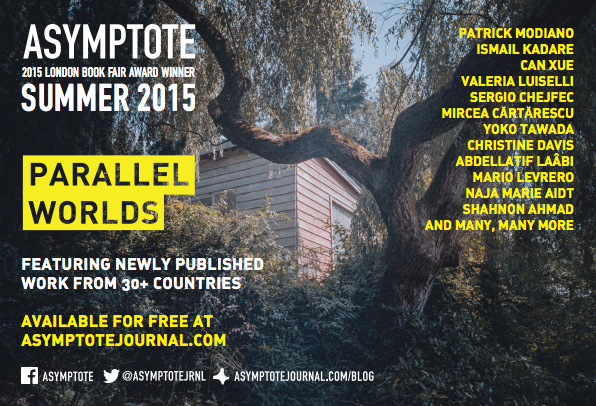Hot off the digital presses!
Asymptote‘s July Issue is now totally, utterly live! This one’s a good one, and highlights are almost too many to mention—almost. We’ve got your usual lot of literary celebs in the mix, including French Nobel laureate Patrick Modiano, Chinese Nobel Prize-worthy writer Can Xue, and an interview with longtime friend of the blog Valeria Luiselli in the mix—among so. many. others. Here are five must-reads to get you going, but this list’s by no means conclusive—and is presented in no particular order:
1. It’s Wednesday, after all, so it’s very likely that you are reading this furtively—toggling between pressing “work emails” and the Journal, all the while sneaking glances over your shoulder. (Don’t worry, we know where your priorities lie.) If you only have a minute, make sure you spend it reading two poems from galaxy limited café by Mexican poet José Eugenio Sánchez and translated by Anna Rosenwong. I kept a keen eye for these poems because Rosenwong recently won the Best Translated Book Award for her poetry translations of Rocío Cerón, so I knew these poems wouldn’t mess around—and they don’t. These are slick, strange, and touchy—just-barely colloquial poems that verge on the surreal. Don’t take their coolness for granted—they pack a hefty emotional punch, and lines like “what do I have in common with your prairies / where the taciturn beasts chewed grass before the flood / never lifting their heads” will leave you shaking yours. —Patty Nash, blog editor
2. This might be our most star-studded issue yet—our translators, our writers, and, as of the London Book Fair, Asymptote itself have all been bestowed with gold medal love. But Ismail Kadare’s an award winner certainly worth knowing: he’s the Albanian winner of the inaugural Man Booker International Prize. Unlike the last suggestion, this story—called “The Migration of the Stork” and translated by Ani Kokobobo—is going to be a bit more of a scroll/stroll. But it’s worth it. It begins with a stroll, too, and involves no slight amount of ambling. —Patty Nash, blog editor
3. Something I’m wildly excited about in this particular issue is our multilingual special feature, expertly edited by criticism editor Ellen Jones. My own personal favorite here is an excerpt from the poetry collection Everything Shimmers by Danish Naja Marie Aidt—gorgeously rendered by my ultimate hero in translation, Susanna Nied, who introduced the English-speaking world to Inger Christensen, the Danish master of prosody. Nied herself is clearly a master when it comes to translating poetry, and her multilingual translation from Everything Shimmers proves it. Check this out: “Spiderweb-fine jellyfish / moon jellies / floating through / the water as through / et himmelrum, a sky / now in / their fifth stage / of peculiar existence and like / the shining violet / veins on your / suntanned hand.”
Also! You might remember Naja Marie Aidt from our Danish fiction feature (edited by me!), in which we excerpted Aidt’s much-anticipated novel Rock Paper Scissors, forthcoming from always-awesome Open Letter Books. In case this doesn’t ring a bell, perhaps you’ve heard of Aidt’s short story collection Baboon (Two Lines Press), which earned translator Denise Newman the 2015 PEN Translation Prize. Just saying. You might want to familiarize yourself with Aidt’s writing if you haven’t already, to spare yourself the humiliation of not knowing (like Anthony Doerr, who recently told the The New York Times that he was embarrassed not to have read Baboon yet!). —Katrine Øgaard Jensen, blog editor
4. I’m endlessly excited about Valeria Luiselli, whom our former Cuba editor-at-large Ezio Neyra has interviewed for this issue. The interview has been translated from the Spanish by Christina MacSweeney and brilliantly prefaced by our senior editor Florian Duijsens. I am happy to admit that I’m fangirling about all things Luiselli at this point; I’ve already lent my copy of her novel Faces in the Crowd to six different people since acquiring it last summer, in addition to recommending Luiselli’s writing to just about a hundred people—thousands, really, if you count the Internet! This woman is dazzling, it’s really that simple. Listen to what she has to say. She interviews as interestingly as she writes. —Katrine Øgaard Jensen, blog editor
5. This multilingual writing special feature is so spectacular that one highlight isn’t enough. As a (second) start, allow me to gesture wildly toward Rajiv Mohabir’s “Four Poems.” Although embedded in the postcolonial and diasporic conditions that ensure the words on one’s tongue never feel wholly at home, these poems don’t affect alienation. Instead, they plant their feet in multiple identities with an assurance equal parts bold and exquisite.
Mohabir calls them “chutney poems.” Hindi, Guyanese Creole, and English bleed into one another: “They knifed your ka—kha—gha—nga, and forked / your tongue into a mimic tongue against your mother.” It’s cerebral poetry, but hardly lacks visceral pull. Mohabir examines sexual, racial, national, and other capital-I Important issues in riveting couplets like these: “The doctors / mined your chest; excavated your wild desire, cast / the queer catch into the sea and it grew a macaw plume.” These are intrepid poems, charting new linguistic territory. You’re going to want to explore. —Hannah Berk, English social media

